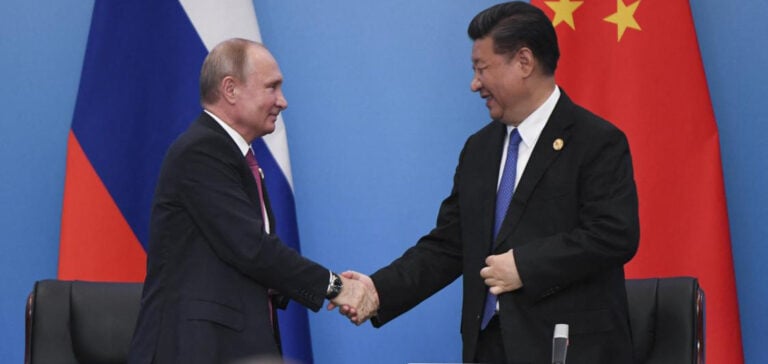Putin in China seeks to consolidate economic and political ties. Indeed, Russian President Vladimir Putin is expected in China next week to meet his counterpart Xi Jinping at the New Silk Roads Forum, marking the 10th anniversary of this major infrastructure project. This visit underlines Russia’s growing dependence on China due to international pressure from its offensive in Ukraine.
New Silk Roads Forum
The New Silk Roads forum, also known as “The Belt and Road”, aims to improve trade links between Asia, Europe, Africa and beyond through the construction of infrastructure such as ports, railroads, airports and industrial parks. Vladimir Putin joins the leaders of 130 countries taking part in the event.
Growing dependence on Beijing
Vladimir Putin’s strategic dependence on China has increased since the start of the Russian offensive in Ukraine, which has isolated Russia on the international stage. The Russian president has avoided foreign travel since the start of the war in 2022, with the exception of a trip to Kyrgyzstan. This visit to China underlines Beijing’s importance as a crucial diplomatic and financial partner for Moscow.
Trade between Russia and China reached record levels in 2022, totaling around $190 million according to Chinese customs. The two countries have pledged to increase this figure to $200 million by 2023. This economic cooperation is seen by Russian and Chinese leaders as offering “truly limitless possibilities and prospects.”
Chinese support for Russia
China refused to condemn Russia’s invasion of Ukraine and sought to play a neutral mediating role in the conflict. Beijing has also provided Moscow with crucial diplomatic and financial assistance. Experts suggest that Putin is seeking increased Chinese support, including lethal military aid, for his war in Ukraine.
China wants to avoid a significant weakening of Russia, as the collapse of Putin’s regime could represent a serious security threat. Russian-Chinese relations, though increasingly close, are also marked by a balance of power, and Beijing could use its position of strength to influence Moscow.
Direct Dependency Relationship
According to experts, Russia is becoming increasingly dependent on China, which is gradually transforming bilateral relations into a relationship of direct dependence.
Vladimir Putin’s visit to China will be closely watched to see how the two countries strengthen their cooperation and manage the geopolitical challenges they face.






















